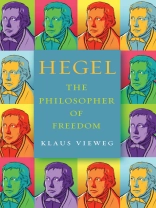A monumental new biography of a pivotal yet poorly understood pioneer in modern philosophy.
When a painter once told Goethe that he wanted to paint the most celebrated man of the age, Goethe directed him to Georg Wilhelm Friedrich Hegel. Hegel worked from the credo: To philosophize is to learn to live freely. While he was slow and cautious in the development of his philosophy, his intellectual growth was like an odyssey of the mind, and, contrary to popular belief, his life was full of twists and turns, suspense and even danger.
In this landmark biography, the philosopher Klaus Vieweg paints a new picture of the life and work of the most important representative of German idealism. His vivid portrait provides readers an intimate account of Hegel’s times and the milieu in which he developed his thought, along with detailed, clear-sighted analyses of Hegel’s four major works. What results is a new interpretation of Hegel through the lens of reason and freedom.
Vieweg draws on extensive archival research that has brought to light a wealth of hitherto undiscovered documents and handwritten notes relating to Hegel’s work, touching on Hegel’s engagement with the leading thinkers and writers of his age: Kant, Fichte, Schelling, Hölderlin, and others. Combatting clichés and misunderstandings about Hegel, Vieweg also offers a sustained defense of the philosopher’s more progressive impulses. Highly praised upon its release in Germany as having set the new biographical standard, this monumental work emphasizes Hegel’s relevance for today, depicting him as a vital figure in the history of philosophy.
Innehållsförteckning
Abbreviations
Introduction
To Philosophize Is to Think Freely, to Learn to Live Freely
1. The Beloved Hometown: Growing Up in Stuttgart, 1770–1788
2. A Student at the Protestant Seminary:Tübingen, 1788–1793
3. A Private Tutor of a Patrician Family: Switzerland, 1793–1796
4. From a Mosaic of Fragments to the Cornerstone of a System: Frankfurt, 1797–1800
5. The Birth of Absolute Idealism: Jena 1801–1807
6. The Political Journalist: Bamberg, 1807–1808
7. The First Humanistic Gymnasium and the Science of Logic: Nuremberg, 1808–1816
8. The Owl of Minerva on the Neckar: Heidelberg, 1816–1818
9. The ’Great Center’: Becoming World-Famous in Berlin, 1818–1831 Obituaries
Acknowledgments
Notes
Index of Names
Om författaren
Klaus Vieweg is Professor of Classical German Philosophy at the Friedrich Schiller University, Jena and one of the world’s leading Hegel experts. Vieweg has authored or edited over two dozen books, with translations appearing in Italian, Spanish, Chinese and English, among other languages.












